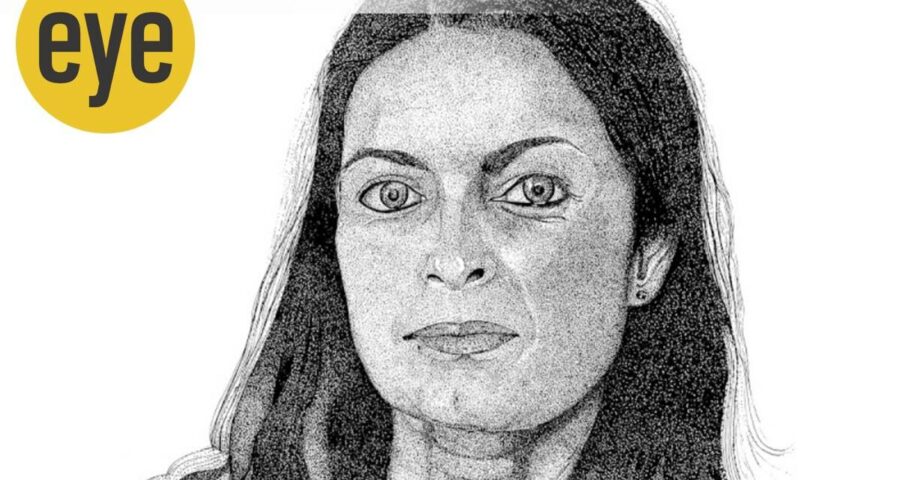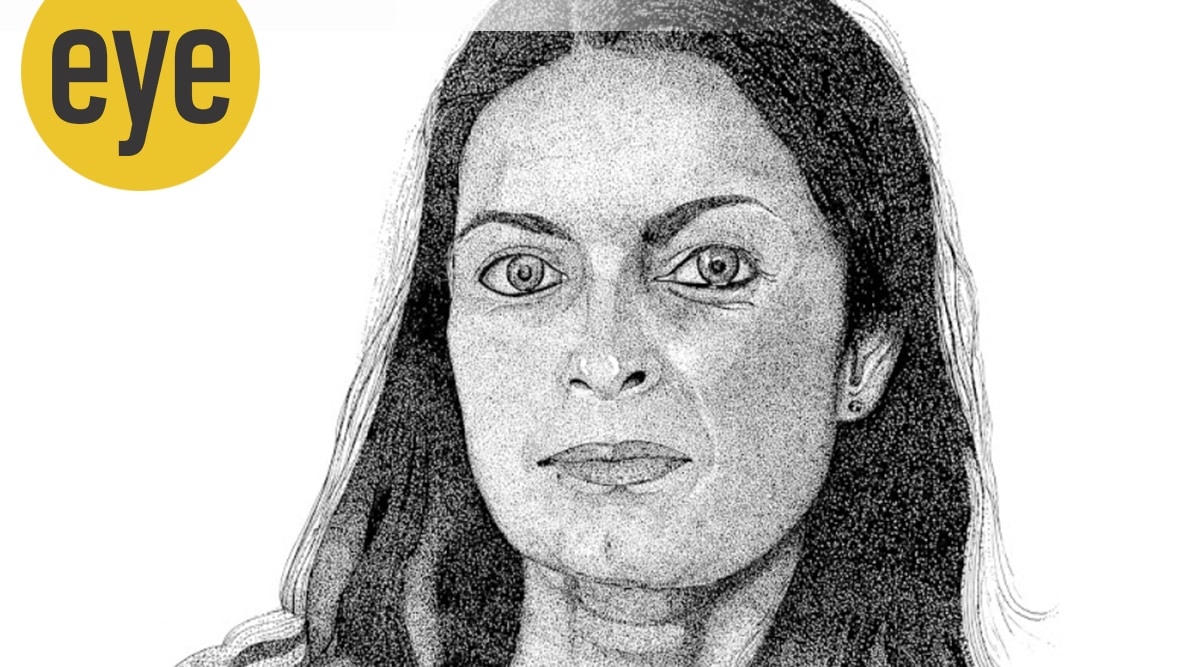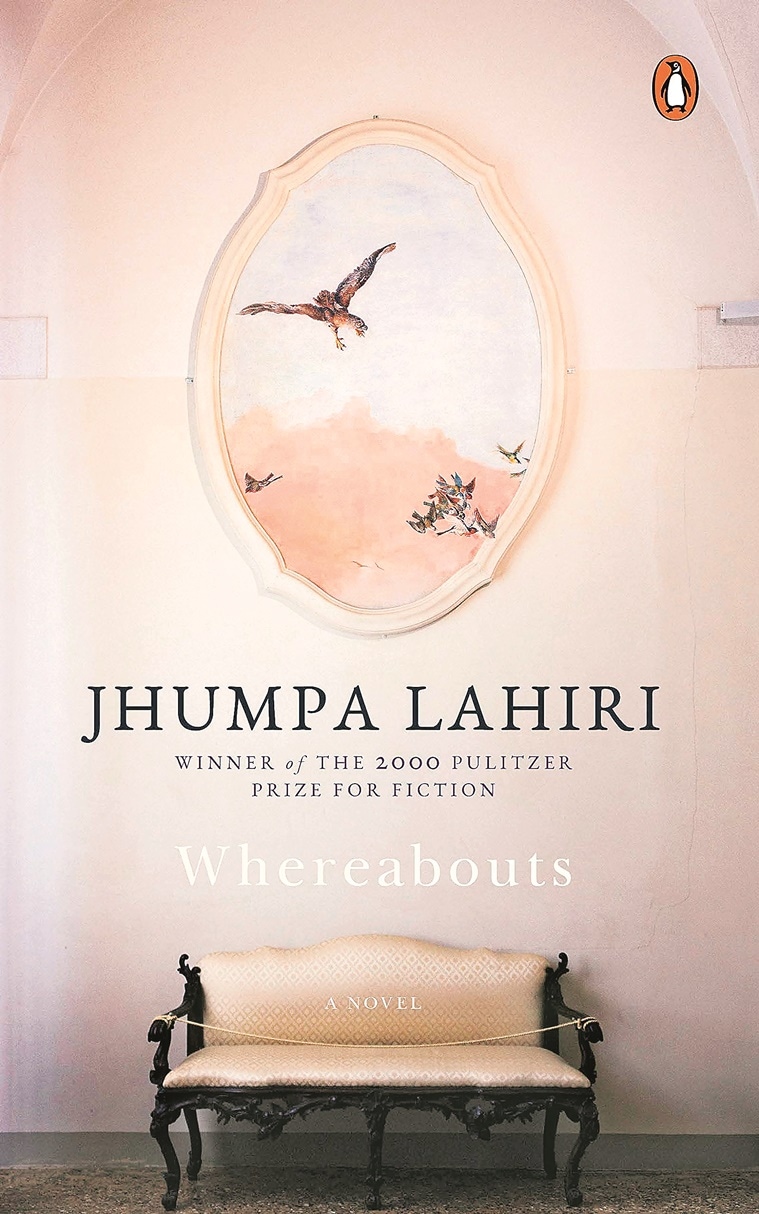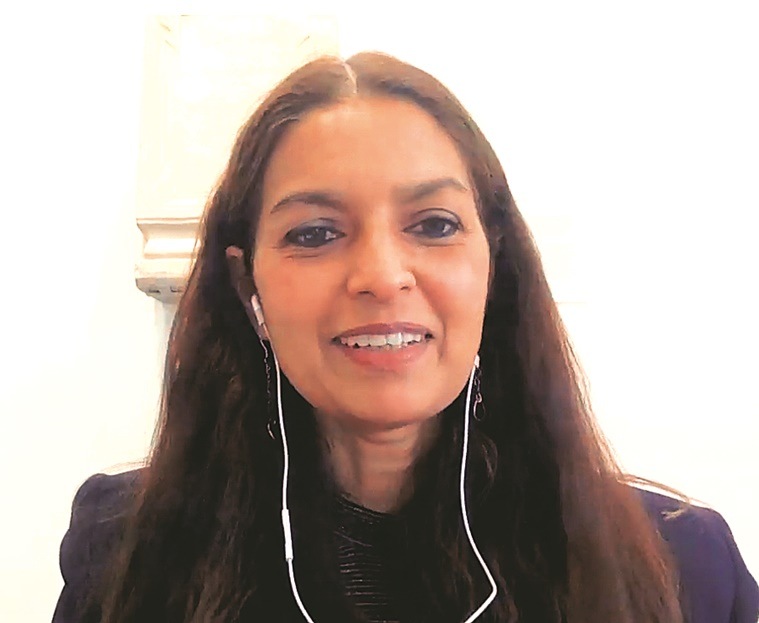Pulitzer Prize-winning writer Jhumpa Lahiri on the complexities of identity, the nature of fame, the idea of home and why translating one’s own work can be a solitary exercise
HER PURSUIT of Italian — the adventure she had embarked upon in 2012, moving to Rome for a few years to discover a language and a culture that had long fascinated her — has been a transformative journey for Pulitzer Prize-winning writer Jhumpa Lahiri. The metamorphosis shows up in her writing, too, leading her, and her readers, to new discoveries in form and content. Lahiri, who has recently translated her first novel in Italian Dove Mi Trovo (2018) into English as Whereabouts (Penguin Hamish Hamilton, Rs 499) — a rumination on the course of loneliness mapped over a year — has been working with translations, essays, and, most recently, poetry.
In this video interview from Princeton University, the US, where the 53-year-old is director and professor of creative writing, Lahiri speaks of the importance of solitude in a writer’s life, finding a sense of home in Italy and the intellectual nourishment that translation affords her.
Edited excerpts:
Unlike any of your previous female protagonists, your anonymous narrator in Whereabouts is free of any defining cultural history. Did that allow you greater freedom to experiment with her voice?
The book was written in Rome, when I was still living there until August of 2015. That whole winter, spring, summer, I was first exploring this character and then I kept revisiting her when I would revisit the city. I think it may give the reader a greater freedom to think about her and to think about what it means to call somebody Italian or American, or any nationality. To take away labels like this can be an interesting way to approach a character and to approach how we think about each other, and ourselves.
At which point did you realise that this was going to be a deliberation on solitude, a middle-aged woman introspecting on her life, which is
not entirely commonplace in literature in English?
I don’t know really. There is all sorts of introspective literature and first-person narratives. I had never written a novel in the first person before. So, I was curious to see where this might go. Any first-person narrative can be very exploratory, very interior, and this is an interior novel, though not
entirely.
What is a writer’s relationship with solitude?
It’s essential to any art, any creativity. But I think it has to be complicated by interactions. The world that you know is, in some sense, interfering and inspiring what can happen in that solitary space, but any writer has to have a pretty robust relationship with what solitude brings because that’s the only way the writing gets done.
So, when you are writing fiction, do you discover where it is going to take you as you write?
Yes, that’s mostly what I’m doing.
Does it change with non-fiction and do you see yourself writing more non-fiction after In Other Words (2015), your first collection of essays in which you explore your complicated relationship with the languages you grew up with?
In Other Words was a series of meditations that I was working out over time. I had gone suddenly so deep into Italian — that was a unique project. I was writing them for a weekly magazine in Italy. You know, I kept a diary for years and years, I’m used to talking to myself, writing to myself. I’ve done this for decades. The vast majority of that writing has never been seen, never been read. It’s a part of the way I think. In that book, I was trying to figure out some things about why I wrote and how, and about language, the principal instrument of the writer. But, fiction is totally different. That’s really what I work on. I like personal essays very much. I think they can be very interesting and powerful. I admire a lot of authors who write in a very personal vein, so, I don’t know. Maybe there will be some other non-fiction book eventually. But right now, there isn’t one.
You wrote extensively about your relationship with the Italian language in that book and how it was born out of your sense of being a linguistic outlier, from a ‘void of origin’. What is your relationship with these three languages now — English, the language you grew up with, your mother tongue Bengali, and Italian?
It depends on what I’m doing. I feel thought and expression are united, they’re rooted right in whatever is being done or being said. So, each of the languages grounds me in a different way and each of the languages also unsettles me in a certain way. That’s always been the case. The proportions shift. For a long time, there was no Italian, and now there is. Now, the whole landscape has altered — there’s a third language and it’s very grounding. It’s also another place, another language. Each of the languages remains another language, and also remains very much part of the essence of who I am.
For several years now, you have been translating Italian texts into English. How was it to translate your own book?
I’ve only had this one experience really, of translating myself. I can say it’s not as gratifying because I feel that I’m not that interested in my own work. I’m interested in other people’s work (among other works of translation, Lahiri was the editor of The Penguin Book of Italian Short Stories, 2019, and has recently won the John Florio Prize for translating Italian author Domenico Starnone’s 2016 novel, Trick, into English) so that I can learn from them and be inspired by them. It’s nourishment from the outside. As a reader, I don’t have that kind of relationship to it (my work), because I made it. I just have the maker’s relationship to it. I feel what’s missing when you translate yourself is that sense of silent collaboration. When I translate another author, whether living or dead, there’s that sense of two writers coming together. I ask myself, ‘Well, how would he or she have wanted this to sound in English?’ And I feel like I’m communicating with another writer, in some sense. I don’t feel that when I’m translating myself. It’s much more solitary.
Did you notice things about your writing that, perhaps, you wouldn’t have otherwise?
Of course! A translator knows a text better than the author, better than pretty much any reader. You have a relationship to the work that goes beyond in some sense, because you are reading that text 25, 35, 55 times, and looking at it and weighing each sentence, each word in a way that the writer doesn’t have to do. I know that because I’ve written my own work and I’ve translated other people’s work and I’ve translated my own work now. It’s incredibly illuminating to translate because it gives you access to a text that you don’t have otherwise. You have to recreate every single bit of it and it goes inside of you in a way that no other form of engagement with the text affords.
Even though your narrator doesn’t travel much, Whereabouts could also be read as a novel about places. Has the last one year of the pandemic changed the way you look at travel or at places?
It’s made me very aware of my place right now, where I am. And (it’s) made me long for other places — wanting to be in certain other places, really any other place sometimes. Because the pandemic has affected our entire world and because it’s been very bad at different times in different parts of the world where I feel deep ties and connections, it’s also made me feel closer in some sense to other places than I normally would. There’s so much concern for what’s happening, for example, in India, or, in Italy a year ago, or in New York. I wasn’t in those three places when things were really bad. So, thinking about those places where I have ties, worrying about the people who are there and not being able to go has been very intense.
Have you travelled since the lockdown was lifted in the US?
Sometimes I’m not sure when the lockdown was even lifted. But no, I have. Since March of 2020, I went back to Italy at one point. I went up to see my parents a couple of times in Rhode Island and I’ve been to New York very recently a couple of times. But I can number on one hand, really, the times I’ve left Princeton. Literally, five trips all year.
How did you navigate the pandemic?
I read and I wrote and I was grateful for the people in my life.
As someone who has deliberated on identity and belonging in her work, how do you look at the rising tide of nationalistic politics across the world, the tendency to fix identities on the basis of language, religion or other such markers?
I can’t relate to it at all. It’s a really dangerous thing. I think that it’s very important now, especially, to think about identity differently and to not fixate on it and to not feel that that is, in some sense, the driving and defining quality of people.
In this book, for example, a lot of people want to know where this woman is from. It always interests me when those questions come up. People will
say, Oh, she’s Roman. But what does that mean? What can that mean?
Identity is such an open thing. It’s something that is created, something that adapts, something that is shifting. I know that because I have experienced that as the child of immigrants whose identity is transformed; my own identity has transformed; my children’s identities are very mixed and complicated (Lahiri and her husband Alberto Vourvoulias have two children Octavio Vourvoulias and Noor Lahiri Vourvoulias), to say the least. I think this is the case for so many people. It boggles my mind that people are so entrenched in terms of what they think they are, where they think they’re from, this attachment to place and to this idea of national identity. Maybe because I’ve never experienced it, I have never felt any national identity at all in my life. So, I question these things very much and I do try to question them in my work in different ways.
Is there a place where you feel most at home?
I do love Rome. I love going to Rome and being in Rome. That has given me an intense sense of being at home. But, I think, in the end, home is a feeling. There’s no automatic place in the world where, if I am there, I will be at home. We have places that we naturally gravitate towards and want to be at and feel good in. There’s a soul’s response to different kinds of environments. I always feel at home in a library wherever I am. I always feel at home when I’m at the sea; when I have my books around. I feel at home with my family; around certain friends. But, as a city, as an actual place on the globe, if I had to sort of put a pin on it, I love the feeling of being in Rome, when I’m living my Roman life. I feel very grounded and at home there.
But, you know, I don’t think it’s right to limit yourself to saying I can only feel at home in this next place. I have seen and observed how painful that is for people, for immigrants especially, who think, ‘Oh, well, home means that place and so this place can’t be home.’ What does it means if suddenly this other place becomes home? Am I betraying everybody? Am I betraying my origins? Am I betraying my family? That can lead to so much anguish. It’s important to revisit this idea of home, because home is very much connected to this idea of identity.
When you look back now, do you think you were prepared for the fame that came with your first book, The Interpreter of Maladies?
Nobody was prepared for the success of that book. Nobody at all. (Pauses) I don’t know. It just happened. It was like getting hit by lightning, but positive lightning, lightning that doesn’t kill you. But it happened when it happened. I acknowledged that it happened and moved on and did what I had to do — just kept making work. Success doesn’t really have anything to do with what comes next. If anything, it can hinder you, complicate things. And so, I tried to just put it to the side. Fame is a very relative concept, especially for writers, because the vast majority of my life, I’m living like anybody else. It’s just that there are very precise moments in which I realise someone wants to interview me or there’s my picture in the paper or I’ll go to an event and there’ll be people who have come, taking time out of their lives, to hear something I have to say. So I understand that that person is there, that that person is a part of who I am, but she’s just a tiny part of who I am. The main part of who I am is a very different person. So, in that sense, it’s a little bit like I have had to separate the parts of myself that wrote Dove Mi Trovo in Italian, and then Whereabouts in English. Those are two different people, but they’re the same person. Similarly, the person who is ‘famous’, is just this one iteration of me, and I think of that person very much as a distant satellite to my day-to-day reality, which is pretty ordinary.
How different is Jhumpa Lahiri the person from the writer?
The writer is the person who I am, and I’m writing, reading and doing my work. And then the person that other people see, is somebody else. I don’t know who that person really is.
Is there a routine to how you write?
It’s changed throughout my life — my life has had so many different phases and different sets of responsibilities. I haven’t written in months because I’m a professor at Princeton and I’m in the middle of teaching and correcting student papers and doing interviews for this new book. I probably won’t write anything on my own for many months to come. But I’m also in the middle of working on other books, revising things and preparing other books for publication.
So, it really has changed. I used to have small children, now my children are older. I’ve very rarely had the freedom to decide how to set up my writing routine. Maybe once in my life, at one point, I had a fellowship for seven months, and I didn’t have a job, and I didn’t have children. And so, in that moment, those seven months, I would try to wake up and write in the mornings until lunch, but sometimes, even later in the day. I was living alone then.
I think the main thing is to somehow maintain a connection with the idea, the space of writing. That, for me, mostly has to do with reading. It’s really important for me to read every day. I write in my diary, sometimes I go for weeks and weeks and I just write a sentence and that’s all the writing I do. Then there are moments where things are calmer and responsibilities fewer and I am able to write more regularly. Now that I have this job here, I tend to just write when I go to Italy. So, I write in the summers. The last time I really wrote anything fresh, anything raw was last summer. Since then, I’ve just been translating, teaching, working on some essays, things like that.
You have been writing poetry, too, I believe, in Italian?
Yes, I wrote a book of poems in Italian and they’re coming out next month. Poetry has its own language. So, it’s like a language within a language.
And literally, before this, not even in private, did I write poems. It’s something that visited me through Italian. They are poems that took me
back to India, back to my childhood, back to all sorts of experiences. So it was an interesting journey, that book.
Source: Read Full Article






